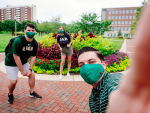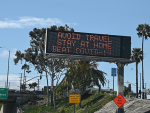Displaying items by tag: school of public health
Observational clinical research of COVID-19 patients can help clinicians better understand how the previously unknown SARS-CoV-2 virus acts, and findings from this research can better inform treatment and vaccine design.
Tagged under
This year, 90 students and their families have been helped by the Little Blazer Wishes program, which supports students who are parents trying to meet their children’s holiday needs and wishes.
Tagged under
Tagged under
Students at UAB are helping with contact tracing by letting people in Alabama know if they have been diagnosed with COVID-19.
Tagged under
“Is Mommy a Doctor or Superhero?” written by emergency medicine physician Amy Faith Ho, M.D., uses colorful illustrations and whimsical characters to show children they can find superheroes within themselves.
Tagged under
UAB’s virtual commencement kit has everything Blazers need to celebrate online and at home, including a custom Spotify playlist, craft and food ideas, and digital goodies.
Tagged under
- release
- commencement
- university relations
- graduate school
- college of arts and sciences
- school of engineering
- neuroscience
- department of chemistry
- school of education
- school of nursing
- school of health professions
- school of public health
- collat school of business
- alumni
- honors college
- division of nephrology
- school of dentistry
- school of optometry
- student affairs
Alice Kim and Ryleigh Fleming each created projects to improve student mask safety, hygiene, and access to health care facts and necessities that were selected by the Clinton Global Initiative University COVID-19 Student Action Fund.
Allowing family members back into your home is a challenging thought for many, but UAB experts share ways we can safely reintegrate under one roof.
Tagged under
Thanksgiving will be different this year because of the coronavirus pandemic, but a safe celebration is still possible with the help of guidelines laid out by UAB experts and the CDC.
Tagged under
Investigators are developing a telemedicine program to reduce vaccine hesitancy related to HPV and the novel coronavirus for adolescents in rural Alabama.
Tagged under
Donate to Blazers Against Hunger, a one-day crowdfunding campaign to raise money for Blazer Kitchen and fight food insecurity for UAB students.
Tagged under
With many experiencing COVID-19 fatigue and burnout as winter months approach, UAB experts provide key resources and tips for creating a plan for your physical and emotional health.
Tagged under
Tagged under
Funding from the American Heart Association will help promote preventive attitudes regarding cardiovascular health through a virtual campaign.
Tagged under
In being named a HEED recipient, the School of Public Health was recognized for its ongoing commitment to community engagement and positive campus climate.
Tagged under
As the country has grappled with an opioid crisis and with COVID-19, a third crisis has brewed. Suicide is now the 10th leading cause of death in the United States.
Tagged under
The study suggests that depressive symptoms are a nontraditional risk factor for stroke, something medical professionals need to take into account when talking with their patients.
Tagged under
Tagged under
The review of COVID-19 positive case rates and state-wide stay-at-home orders suggests that stay-at-home orders helped reduce transmission of the SARS-CoV-2 virus.
Tagged under
Tagged under



















